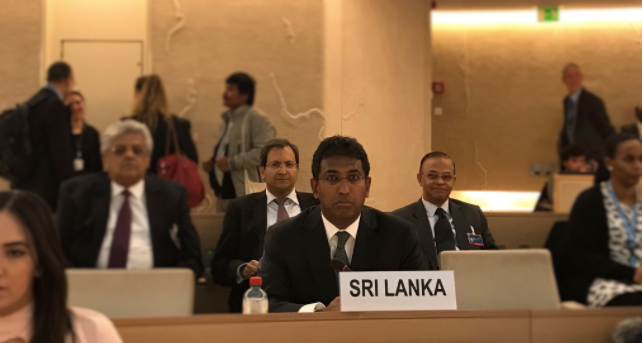Image: Deputy Foreign Affairs Minister Harasha de Silva speaking at UNHRC 34.
Sri Lanka Deputy Foreign Affairs Minister Harasha de Silva has told state controlled Sunday Observer that UNHRC 30/1 resolution does not call for a hybrid court and the word participation has multiple definitions!
This what he has told the Sunday Observer:
“I think it’s best that I try and clear the confusion. What the 2015 resolution 30/1 says in terms of foreign and Commonwealth involvement is that there should be ‘participation’ of inter alia foreign and Commonwealth judges, within a Sri Lankan judicial mechanism.”
“Participation has multiple definitions. What certain sections are trying to say is that ‘participation’ means a ‘hybrid court’ that consists of foreign judges sitting on the bench hearing cases. By misleading the public into equating ‘participation’ to ‘hybrid’ some Sinhala groups claim, the Government sold out and some Tamil groups claim, the Government gave in.”
“What the President and the Prime Minister and also the Foreign Minister have said is, that is NOT the case. There won’t be any hybrid court for several reasons, but, from a legal and technical perspective, because the Sri Lanka Constitution does not allow foreign judges to sit in judgment; in other words ‘participation’ cannot mean ‘hybrid’. Surely, it is not something that difficult to understand.”
“It is in this context that the word ‘participation’ takes shape. It can mean ‘expertise’ or ‘observation’ or any such other, but NOT hearing cases. During MR’s time as well there were instances, including where the Indian Chief Justice Bhagwati also was involved in both ‘expertise’ and ‘observation’. There are several other examples including Darusman, the former Attorney General of Indonesia.”
“So, it is only to mislead the people that certain elements will use the word ‘participation’ to mean ‘sitting in judgement’ in a ‘hybrid court’ to suit their narrow political agendas. I urge the public not to be misled.”
“Plus, there are many other more important things. A compassionate council on a truth mechanism might be something that can deal with all these issues, instead of courts. The Missing Persons Office has already been legislated. Handing back private land is continuing. All these are what we should focus on.”
The news paper has added its own explanation of what the minister has said.
What the Deputy Foreign Affairs Minister makes clear is that Sri Lanka will not be able to completely rule out foreign judges and prosecutors in its war crimes investigation and prosecution. What can be negotiated, however, is the level of their engagement.
The differences over the involvement of foreign judges aside, the Sri Lankan government will have to take meaningful steps in the direction of accountability and reconciliation within the next two years, which includes the establishment of the Truth and Reconciliation Commission and the Office of Missing Persons.
While ensuring a credible mechanism locally, the government will have to communicate its position on hybrid courts to the international community, including the member nations of the UNHRC, in a convincing manner. The success of this attempt will also hinge on Sri Lanka’s ability to ensure independence and impartiality of the judiciary, especially, when it comes to cases involving the military.
It is a widely-held perception, especially, in the international domain, that the cases involving the military are not heard objectively and impartially in the Sri Lankan judiciary due to various sensitivities involving the war heroes. While the government is sensitive about political repercussions of such cases, the opposition tries its best to politicize these issues and achieve petty political gains. This hampers Sri Lanka’s plans for a Sri Lanka-led credible war crimes investigation mechanism.
One such example was the case involving Sunil Ratnayake, a former staff sergeant attached to the Sri Lanka Army, who was found guilty for the murder of eight Tamil civilians in Mirusuvil, Jaffna in 2000. The Colombo High Court sentenced him to death after a 13-year-trial.
